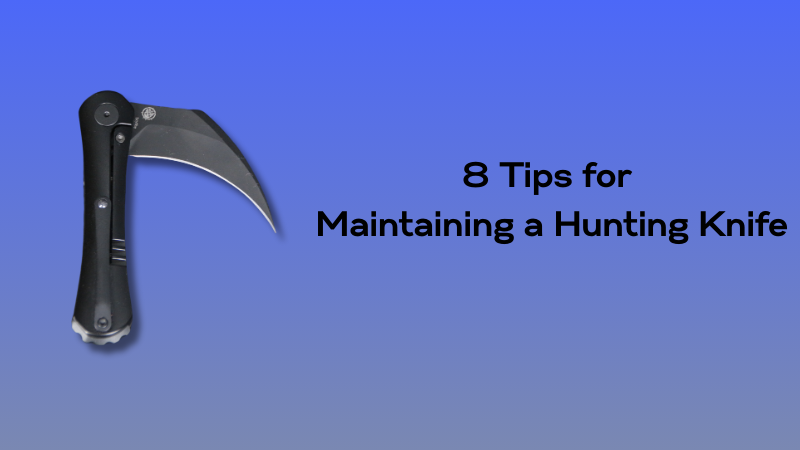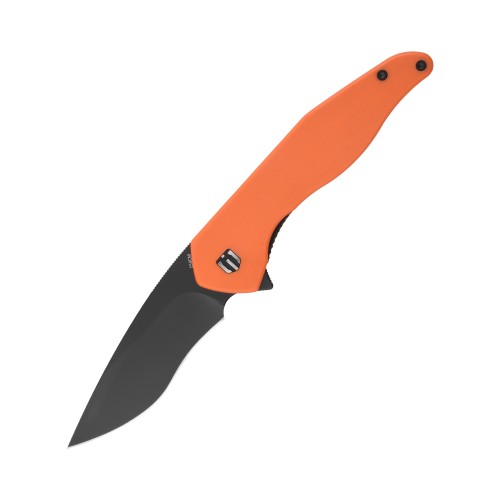
8 Tips for Maintaining a Hunting Knife
 A
hunting knife is an essential tool for any hunter, helping with tasks such as
skinning, butchering, and general outdoor survival. However, even the most
rugged hunting knives require proper care to maintain their performance over
time. If you’ve invested in a high-quality knife, like a Shieldon knife, ensuring
its upkeep is crucial to prolonging its life and effectiveness.
A
hunting knife is an essential tool for any hunter, helping with tasks such as
skinning, butchering, and general outdoor survival. However, even the most
rugged hunting knives require proper care to maintain their performance over
time. If you’ve invested in a high-quality knife, like a Shieldon knife, ensuring
its upkeep is crucial to prolonging its life and effectiveness.
In
this article, we’ll explore practical tips for maintaining your hunting knife,
including regular cleaning, sharpening, and storage, to keep it ready for
action whenever you need it.

Why Proper Maintenance is Crucial for Your Hunting Knife
Taking
care of your hunting knife is important for several reasons:
Maintain Sharpness: A dull knife
can be more dangerous than a sharp one. It’s harder to control, making it more
likely that you’ll slip and injure yourself. Regular sharpening is essential to
preserve its cutting performance and to ensure safe, precise cuts.
Prevent Rusting: Keeping your knife
clean and oiled will prevent rust from forming, especially if you’re hunting in
damp conditions. Even if your knife features rust-resistant steel, consistent
care is necessary to avoid discoloration and damage.
Aesthetic Appeal: A well-maintained
knife not only works better but also looks great. If you ever decide to sell
your knife, keeping it polished and free from blemishes will help retain its
value.
Check for Damage: Regularly inspecting your knife helps identify any loose parts, cracks, or damage that might affect its performance. A broken handle or loose blade can be dangerous, especially in high-pressure situations.

Best Practices for Hunting Knife Maintenance
Here
are eight expert tips for keeping your hunting knife in prime condition:
Lubricate Your Knife Regularly
Lubricating
your folding hunting knife ensures that the moving parts remain functional and
free from friction. Use a quality lubricant to coat the joints and pivots, but
be sure to wipe off any excess to avoid a greasy mess. This reduces wear and
tear on the mechanism, especially for multi-tool knives or EDC knives that have
multiple moving components.
Sharpen Your Hunting Knife
A
sharp blade is essential for all hunting tasks. A dull knife makes skinning and
butchering more difficult and time-consuming, not to mention unsafe. Regularly
sharpen your hunting knife using a sharpening stone or specialized tool. Don’t
attempt to sharpen it with a rock or other improper materials, as this can
damage the blade.
Clean and Dry Your Knife After Each Use
Whether
you're using a Shieldon pocket knife or any hunting knife, it’s crucial to
clean it after each use. Rinse off any blood, dirt, or debris with water and
mild soap. Make sure the knife is completely dry before storing it, as moisture
can lead to rust and corrosion.
Use the Knife Properly
Every
knife has a specific design suited to certain tasks. For example, if you’re
using a martial arts knife or an EDC knife for self-defense, using it for
heavy-duty tasks like chopping wood can damage the blade. Always use the
correct knife for the right job to prolong its lifespan.
Avoid DIY Repairs
While
it might be tempting to fix minor issues on your own, knives, particularly
folding knives, can have complex mechanisms that require professional repair.
If you notice any issues with your knife, such as a loose blade or broken
handle, take it to a specialist for inspection and repairs.
Maintain the Handle
The
handle of your hunting knife is just as important as the blade. Depending on
the material (wood, plastic, metal), you may need to follow different cleaning
methods. Regardless of the material, always keep the handle clean and free from
dirt, which can cause it to become slippery and unsafe.
Proper Storage is Key
When
you’re not using your hunting knife, proper storage is essential. A folding
knife should be kept in a safe place, such as a pocket or sheath, to prevent
accidental injury. If you own a fixed-blade knife, store it in a protective
case or sheath to keep it dry and safe from exposure to moisture or dirt.
Replace Damaged Parts When Necessary
Sometimes
accidents happen, and parts of your knife may get damaged. If you’re not ready
to replace your knife entirely, you can often replace individual components
like the blade or handle. Have a professional handle the repairs to ensure that
the knife is restored to optimal condition.

Conclusion
Your
hunting knife, whether a Shieldon
folding knife, a pocket knife, or a martial arts knife, is a valuable tool
that requires regular maintenance to keep it performing at its best. By
following these maintenance tips, you can ensure that your knife remains sharp,
rust-free, and ready for any adventure. Regular care and proper storage not
only extend the life of your knife but also enhance its reliability when you
need it most.
For
hunters and outdoor enthusiasts looking for high-quality knives, be sure to
explore Shieldon’s wide selection of premium knives. From pocket knives to
tactical blades, we offer tools designed to meet the highest standards of
quality and durability.


